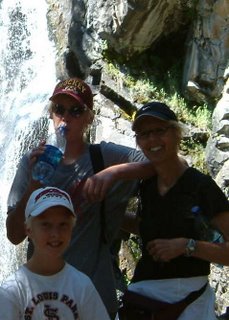
I'm a huge Rick Beach fan - I really liked his class about teaching digital literacy and just plain like the way he teaches. His introduction to Why Use Digital Writing was a good recap of his course objectives and basically, the course itself. Rick talks mostly about blogging and wikis as a means to "foster specific literacies associated with learning to write." I believe that the most important aspect of digital literacy is audience. It's fun for students, including us, to write for a wider audience than just writing to a teacher. It's also fun for students, myself included, to check out other blogs and find out what other students are writing. In other words, it great to write to a wider audience and be an audience member. The active participation in blogging is engaging and fun. After writing a wiki chapter, I think it's a great way to ask students to research topics. Again, audience comes into play and students engage on a different level - it matters to them if someone else might see their work. I disagree with Beach about chatting in chat rooms or chat area as a productive classroom activity. I have yet to see it work with teenage students, or even students our age. There is just too much room for too much goofing off and goofing around. Jenkins' concern is valid too. We need to teach our students dig lit to give them the currency they will need to navigate the world they will enter when they leave school. Students do need to be able to think critically about the digital, multimedia, multimodal world they live in.
However, Mindworks gives us a cautionary tale about dig lit gone too far. Here is the text of an article in March 5th Source/People section:
What if you asked a question and nobody answered?
Unfortunately, that's what happened with the March Mindworks. We've been experimenting to make Mindworks more interactive and interdisciplinary. The March assignment was for students to record themselves making music with found objects or handmade instruments. Their submissions would have been shown in a YouTube.com-style online feature.
We did not get a single submission, possibly a first in 25 years of Mindworks. In an unscientific e-mail poll, several teachers wrote that they liked the idea behind the prompt, but that the logistics of making instruments, composing or choosing music and finally recording it and sending it in were too much in an era of high-stakes testing and standardized curriculum. Others wrote that as teachers of English and language arts, the idea of suddenly orchestrating and producing a music recording was just too much of a stretch.
The dig lit we assign must purposefully connect meaningful learning and literacies with the student and the medium we choose. Kids are smart, they smell an assignment that wants to be "interactive and interdisciplinary" for its own sake and not for the sake of meaningful learning.
My website for this unit is Rick's teachingmedialiteracy.com - a great site for all of us to bookmark

3 comments:
Nice work here - I too enjoyed our blogging. Also, nice website choice, that's what I put. Why not share, we did a lot of work for it? I hope to be in an environment where I can use blogging instead of or in coordination with literature circles.
Yea, Sara! I think you bring up a really valid point: sometimes shooting electronic waves out into the universe does not elicit a response. That can be very diappointing for students when they've worked hard to put something together for a "larger public audience."
On the other hand, do you think there's a danger in exposing them to open public responses? It worries me a little, but maybe I'm just too much of a worrywart...
Thanks! And good luck student teaching!
Nice work, Sara. You are right on about Rick. His class and his teaching style were so what we needed. And what you say about not getting a response is something that we will have to think about when we're teaching digital literacies.
Post a Comment